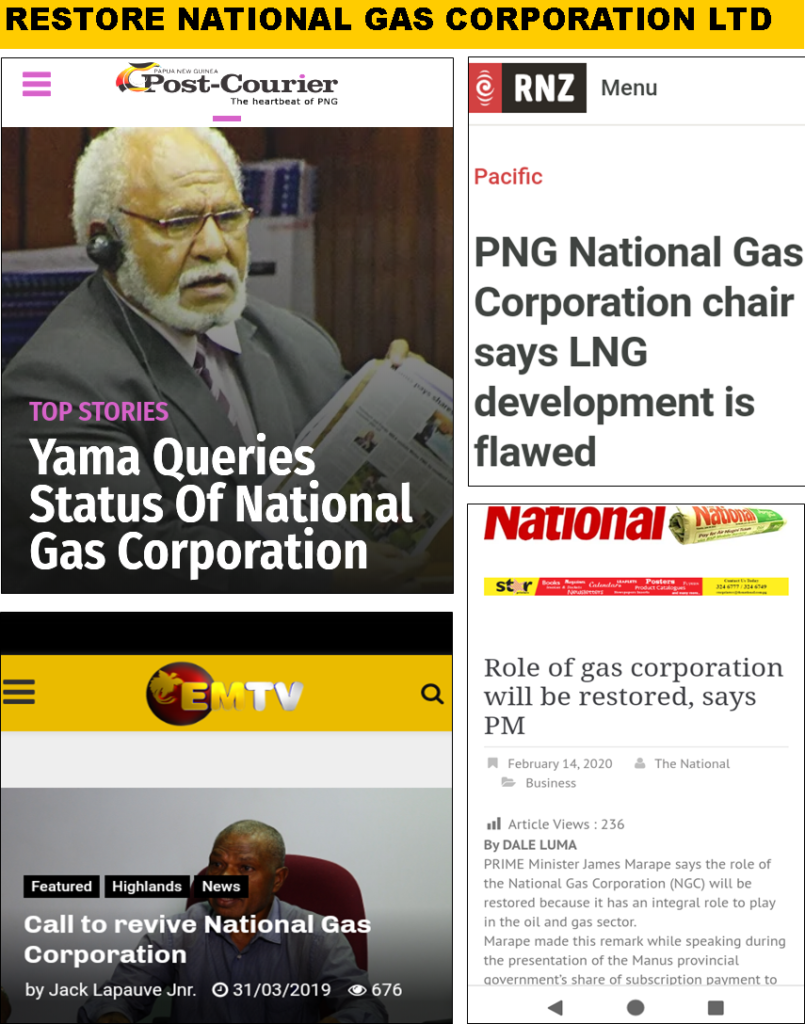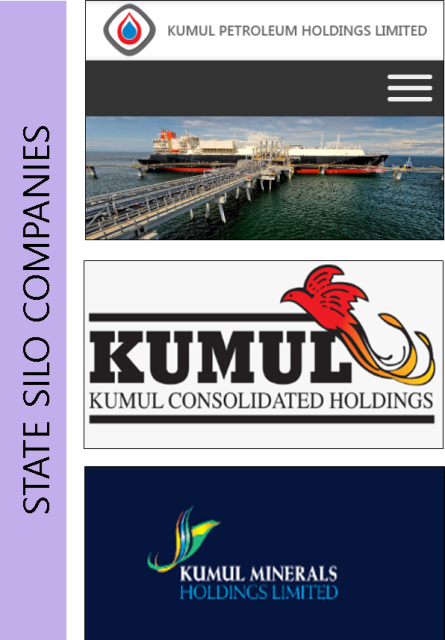By CYRIL GARE – Freelance Journalist
WHAT drove the government to abolish the Department of Public Enterprises (DPE) in 2018 for the third time remains unexplained. What becomes as a result is a Minister for State Enterprises without a department to run. So where does the State Enterprise Minister gets his advice and policy direction from or if ever there should be a ministry at all without a department to run?
DPE was first abolished in 2011 (NEC Decision No. 119/2011) but re-established in 2013 (NEC Decision No. 235/2013). In 2016, DPE was again abolished and merged with Department of Treasury. Most recently in August, 2018 the government has again for the third time abolished DPE – NEC Decision No. 15/2018.
Then Prime Minister, Peter O’Neill said in a media statement this was part of his government’s Public Sector Organisational Reform initiative saying, “we are continually striving to improve the performance and delivery of our public service.”

For better or worse, the Marape government continues to further the public service reform to address issues of duplication of functions, and make alignments so to achieve efficiency in service delivery. NAQIA (National Agriculture Quarantine and Inspection Authority) for example, a well performing scientific organisation under the Department of Agriculture and Livestock (DAL) has now had its functions transferred to Immigrations and Border Security while Customs had its’ transferred to Finance department.
State Silo Companies
During its time, DPE did well in five years, it was able to create, among others a consolidation of silo State companies with assets and healthy balance sheet worth around K50 billion. State is using some of these assets as security for borrowing purposes.
Three mega State companies including Kumul Petroleum Holdings Limited (KPHL), Kumul Minerals Holdings Limited (KMHL) and Kumul Consolidated Holdings Limited (KCHL) which comprises more than 10 State enterprises like Air Niugini, Water PNG, MVIL, PNG Ports Corporations, PNG Power and others were created under the Rationalisation of State Assets exercise undertaken by DPE between 2012 and 2015.
The Singapore’s GIC (Government Investment Corporation) and Temasek models were the envy of the PNG’s creation of silo structures.
Risk for Clash
But the rise of State silo companies creates a ‘risk for clash’ with the legislated mandate of existing bodies such as the National Gas Corporation, an offspring of the Oil and Gas Act 1998 (OGA).
The OGA: Is a comprehensive legislation governing the exploration for and production of petroleum (including oil and gas) in Papua New Guinea, including the offshore area, and the grant to traditional landowners and Provincial Governments and Local-level Governments of benefits arising from projects for the production of petroleum including oil and gas and the processing and transportation of petroleum and petroleum products in Papua New Guinea.
KPHL: Is the National Oil and Gas company (NOC) created by an Act of Parliament – Kumul Petroleum Holdings Limited Authorisation Act 2015 which replaced NPCP Holdings Limited. NPCP only changed its name to Kroton No.2, the self-company created in Kokopo during the UBSA, that hijacked NEC Decision No 223/2008, that directed the then Minister for State Enterprises to align all State Entities, including the NGC, as to how they would participate in the PNG LNG Project.
KPHL is mandated to protect and maximize the value of the Country’s petroleum assets so that it can contribute to the maximum wealth for the people of Papua New Guinea. KPHL’s core commercial interest being its participation in the PNG LNG Project where its currently responsible for managing the State’s 16.57% equity in the US$19 billion (K67 billion) PNG LNG project, becoming the 3rd largest partner in the largest single investment made by the nation to date. KPHL has great potential to grow as a NOC because PNG has high oil and gas resources and largely because KPHL is the legislated State nominee and can always exercise its option for a 20.5% stake in every project. Consistent with its vision, KPHL will continue to create value and opportunity for PNG and its people by becoming a major national oil and gas corporation. This means “creating wealth and opportunities for Papua New Guinea now and into the future”. Source – http://kumulpetroleumholdings.com
As it is, there appears to be no clash of the legislated mandates between KPHL and the NGC. KPHL is owned by the National Government to hold the Government’s upstream equity while the NGC is the national downstream processing vehicle mandated by law under S.179 of the OGA. NGC is owned by the 22 Provincial Governments (PGs) and is mandated to manage the gas project areas landowners’ (GPALOs), Local Level Governments’ (LLGs) and PGs’ interests.
The Kokopo Ordeal
Fine, but what is clear and encumbers a betrayal on the NGC by State was the deliberate exclusion of the NGC in the PNG LNG project agreement signed in 2008, Kokopo UBSA in May, 2009 and the Various LBBSAs between 2009 and 2010.
In the original PNG-Queensland pipeline project (abandoned in 2002), NGC was given a 4% stake in the Hides PDL1, a reduction from 12.5% ownership of Hides PDL 1.
Whereas in Kokopo, the legislated mandate of the NGC was hijacked, spurned and asphyxiated. It was a deliberate act of malevolence driven by greed and self-interest.
The national government through various National Executive Council (NEC) decisions recognize NGC’s legislated mandate to participate in gas projects or gas related projects including downstream processing.
However, when tested during the signing of the PNG LNG Agreement, UBSA and the LBBSAs, NGC was denied of its lawful space in these agreements.
Hypocracy is when government advocates yet does not conform to his words.
Protesting the Kokopo ordeal, the 22 infuriated governors met at the Governors’ Conference in Madang on July 12, 2018 and resolved to:
- Re-negotiate the PNG LNG Agreement, UBSA and the LBBSAs;
- Revisit the National Gas Corporation and the Oil and Gas Act with the view of increasing benefits to the provincial governments and their interests;
- Start class action against major corporations that are meddling with national policies and legislations administering resource development in PNG.
Inviolable Trustee
The NGC remains the inviolable legislated Corporate Trustee for the purposes of managing participating interests (reserved equity) and royalty and development levies accruing to Provincial Governments, affected Local Level Governments, and Project Area Landowners from gas projects.
There is no room for malfeasance. The government is legally-bound to recognize and enforce the law pertaining to the NGC. Section 48 of OGA is intransigent and compliant. It explicitly provides for NGC’s space in any gas project in PNG, by specifically providing that NGC must me an issue during a section 48 development forum. During the Development Forum, the NGC explains how it will utilize its Corporate Trustee Role under sections 176 and 179 combined. By law, NGC must be discussed in a Development Forum and be part of the Development Agreement.
It is the lawful duty of the government to ensure that NGC participates in all gas projects and further, participate in the upcoming Development Forum for the Papua, P’nyang, Twinza/Pasca and other oil and gas projects in PNG. It is illegal for gas project proceed to signing Gas agreements of Development Forums, without NGC participation from day one. NGC already has shareholders resolution to go to court. The Prime Minister must ensure that this scenario is avoided.
Way Forward
Prime Minister, James Marape has expressed support for the revitalization of the NGC. He made his intentions clear on Feb 13, 2020 during the occasion of the delivery of Manus Provincial Government’s cheque presentation of K950, 000.00 into the NGC Ltd as its equity share holding.
In section 9 of the Prime Minister’s 12 months report, again the Prime Minister reiterated his government’s intention to pursue “for equitable sharing of benefits, the government resurrected the National Gas Corporation (NGC) to become the entity to participate in the downstream processing sector, taking charge of Domestic Market Obligations (DMO)”. He said Take Back PNG is about “getting the best deals on negotiated term sheets” for our resources, our people.
On 3rd September, 2020 the Prime Minister clearly demarcated the legislated boundaries between NGC, KPHL and the MRDC on the floor of Parliament during question Time by Madang Governor, Peter Yama. He said Take Back PNG is about “getting the best deals on negotiated term sheets” for our resources, our people.
Prime Minister also announced that the government will replace the licensed-based legal regime (Oil and Gas Act 1998 and the Mining Act 1992) with a production sharing regime to come into effect by 2025. Amended legislations should be before Cabinet by this time.
The government intends to anchor the production-sharing model constitutionally so that no future government can change it at the whim and behest of stakeholders in the industry.
On the floor of Parliament, the Prime Minister has also acknowledged MRDC as the equity holding company of project area landowners. By law MRDC is mandated to manage all oil and mineral interests of project landowners and Provincial Governments. Section 179 (2) (e) of the OGA says that for gas projects, the NGC is the legislated manager. This raises the legitimacy of MRDC in managing the 2.78 % upstream Coordinated Development and Operational Agreement (CDOA) equity interests and the 4.27% Kroton equity by KPHL. Current arrangement is not only obscure it is illegal and a hijack of NGC’s legislated mandate. Its tedious task now to “take back PNG” from within first.
The proposed Organic Law and the Petroleum and Energy Bills propose to duplicate and hijack the legislated mandate of the NGC and lump everything in KPHL. This duplication begins in the so called National Energy Policy. This contradicts the PM. The Prime Minster has said that the government has restored the lawful commercial business of the NGC for the benefit of every Papua New Guinean in their gas resources through their respective provincial governments.
NGC remains the inviolable domestic gas operator, domestic gas producer, responsible for downstream processing of gas in PNG to ‘fire power for energy’ and meeting its Domestic Market Obligations (DMO) for the country.
The NGC has written to the Prime Minister highlighting risk of “proposed hijack” by the KPHL of NGC’s legislated mandate.
The Prime Minister has told Parliament that his government will correct that mistake. The PM has spoken. Those below him, including ministers, must ensure that the proposed Organic Law and authority Bills does not duplicate and hijack NGC’s undisputed legislated mandate under S.179 of the Oil and Gas Act 1998.

